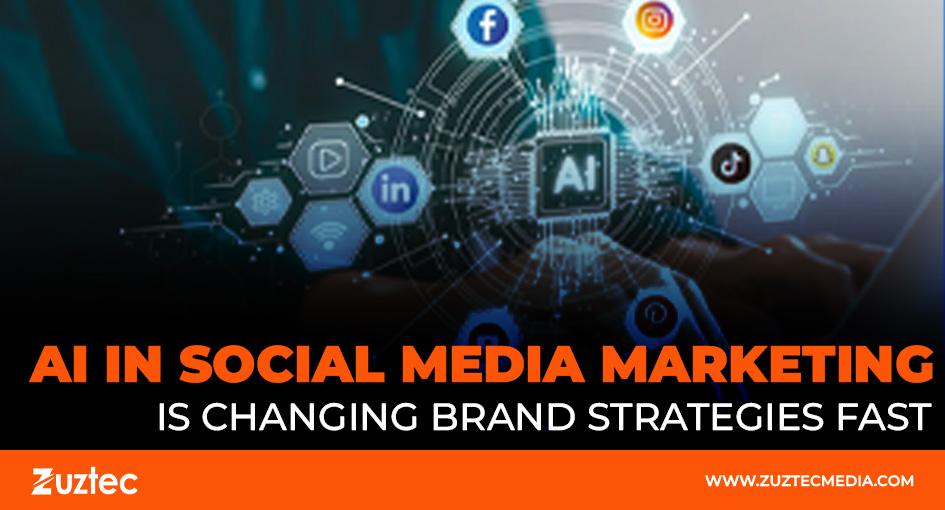
AI In Social Media Marketing Is Changing Brand Strategies Fast
The integration of artificial intelligence into digital marketing is rapidly transforming how brands interact with audiences on social platforms. In recent years, AI in social media marketing has evolved from a future-facing idea to a practical necessity for companies aiming to stay competitive. As more users spend time online, brands are looking to automate, personalize, and optimize their content strategies through advanced technologies.
Marketers today are expected to deliver relevant content at the right moment and to the right people. AI makes that possible by processing large volumes of user data and predicting behavior patterns. From chatbot automation and sentiment analysis to AI-generated images and caption suggestions, artificial intelligence is now embedded in nearly every stage of campaign execution. It helps marketers reduce time on repetitive tasks and focus more on creative and strategic work.
Audiences are more likely to engage with brands that speak directly to their needs. With machine learning algorithms, marketers can track audience behavior in real-time and tailor content that matches user preferences. This boosts engagement, click-through rates, and conversions.
Additionally, platforms like Meta, LinkedIn, TikTok, and X are all introducing AI tools to help businesses get better results from their campaigns. Whether it’s recommending the best time to post or automatically testing ad creatives, AI provides a layer of intelligence that simplifies decision-making.
How AI In Social Media Marketing Improves Campaign Results
It is no longer a trend—it’s a necessity. Brands are using it to automate processes, generate insights, and predict campaign outcomes. AI tools can analyze engagement metrics in real-time, identifying which posts are performing well and which ones need adjustment. This enables faster decision-making and more effective content strategies.
One major advantage of using AI is personalization. With access to user behavior data, AI can recommend content types, posting times, and even tone of voice that aligns with the target audience. This precision allows brands to move beyond generic messaging and deliver experiences that feel one-on-one.
AI-powered chatbots are another essential component. They handle customer service inquiries around the clock, provide personalized recommendations, and increase response times. These bots help brands maintain active communication while freeing up human resources for more complex tasks.
Social listening is also enhanced by AI. It can scan millions of posts and comments to identify brand mentions, sentiment, and trending topics. This gives marketers valuable insights into how audiences feel about their content, products, or services. These insights can then inform content creation, ad targeting, and influencer collaborations.
AI Tools That Are Reshaping Digital Strategy
AI’s role in marketing goes beyond automation. It’s also driving creativity. Tools that generate image concepts, write captions, and even suggest campaign angles are helping marketers brainstorm faster. Many brands use generative AI to test multiple ad versions before launching a campaign.
On platforms like Instagram and TikTok, AI analyzes what types of posts get the most reach and engagement. It then recommends the best styles, formats, and hashtags. This feedback loop helps marketers refine their strategies over time.
Within the midbody of digital strategies, understanding the power of AI in social media marketing can make a major difference in campaign outcomes. With deeper insights and automated optimization, marketers are no longer guessing—they’re acting on real data.
Challenges Marketers Face When Using AI Tools
While AI is powerful, it’s not without challenges. If everything is automated, content can feel robotic and disconnected. Brands need to balance AI efficiency with emotional intelligence.
Another issue is data privacy. AI relies on user data, and marketers must ensure they are collecting and using that data responsibly. With evolving privacy laws and platform restrictions, staying compliant while still getting value from AI tools can be complex.
Training and adoption can also be barriers. Not every team is equipped to use AI effectively. It takes time to learn the tools, test features, and integrate them into existing workflows. However, the brands that invest in this now will have a clear edge in the future.
The Future Of AI In Marketing Looks Bright
The use of artificial intelligence in marketing will continue to grow in the coming years. As tools become more intuitive and widely available, even smaller businesses will be able to harness their benefits. AI will become a co-pilot for marketers, offering real-time suggestions and helping teams focus on strategy and storytelling.
In the future, we can expect deeper integration between AI and social platforms. Features like automated video editing, voice-over generation, and dynamic content adjustment will become standard. Brands that stay informed and adopt these innovations early will benefit from increased efficiency and stronger engagement.
Marketers should also prioritize the ethical use of AI. Being transparent with audiences about automation, using AI responsibly, and ensuring content remains authentic will build trust. Consumers want to know that there’s still a human behind the brand voice.
In conclusion, adopting AI in social media marketing allows brands to improve performance, scale faster, and connect more deeply with their audience. As the tools evolve, marketers must learn to balance automation with authenticity to deliver campaigns that feel both smart and sincere.

